Why Human Beings Tell Stories
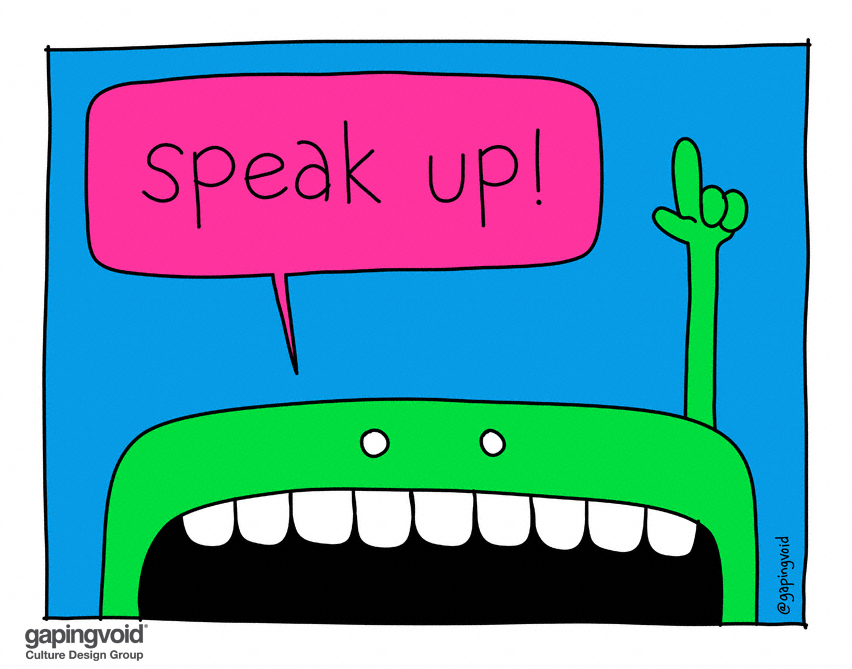
Mention the word "storytelling" to most people and they will immediately think fairy tale, CNN spin doctor, or teenager explaining why they haven't done their homework. Good for entertainment and distraction, perhaps, but not much more. Guess what? Not true. Storytelling is the most powerful communication tool the human race has ever conceived. Why? Because it delivers the goods in at least nine different ways:
1. TO DISCOVER WHAT WE ALREADY KNOW: I don't know what your nationality is. Nor do I know what your religion, philosophy, or IQ is. But there is one thing I do know: You are a human being -- a member of a species known as "homo sapiens" -- a Latin phrase that translates as "the wise ones".
A quick glance at the evening news is likely to reveal otherwise, of course, but if you a dig deeper, you cannot help but notice that our species has learned a thing or two along the way. And not just how to use our opposable thumbs, make fire, and open 25,000 Starbucks. Like how to be compassionate, for example. Like how to be grateful. Like how to be of service to others -- all aspects of what it means to "know thyself."
All of us have had at least one "know thyself" moment. For some of us, this moment may have been sparked by the birth of a child. For some, it was a near death experience. For others, maybe it was meditation, meeting a spiritual Master, or being on the receiving end of a stranger's kind deed. For most of us, these moments are fleeting. Like dreams, they quickly fade from memory. But out of sight, does not necessarily mean out of mind. Invisible is not the same thing as non-existent. Our "wise one" moments are simply hidden from view. They are merely hiding. And where they are hiding is in our stories -- the life experiences we've had that, once told, give shape to insight, feeling, and deep lessons learned.
"Don't tell me the moon is shining," said Anton Chekov, "show me the glint of light on broken glass." That's why stories are so powerful. They give us a way to see the light of our lives reflected and a chance to share that light.
Tuning into our stories allows us to reverse engineer what we know -- to decode and decipher the hidden wisdom of our lives. Just like the atom contains protons, neutrons, and electrons, our stories also contain essence -- the invisible distillate of our life experiences. The microscope we need to see this distillate? Our own curiosity, much in the way an archeologist is moved to dig beneath the surface of things. But curiosity is only half of what's required. The other half? Speaking our experiences aloud! Because, more often than not, it is in the telling of our stories that light is shed on our wisdom. And the more that light that is shed, the more of our wisdom is unearthed. Now, we don't just know. We know we know.

2. TO CAPTURE ATTENTION: This just in: The attention span of the average human being is one second less than the attention span of a goldfish. According to Canadian researchers, the average goldfish can concentrate for nine seconds. The average homo sapien? Eight.
The reasons for our distractability are many, but the biggest can be attributed to our increasingly digitalized lifestyle. Bottom line, there's simply too much coming at us to stay focused on anything for very long. And so, we look for shortcuts. We tweet. We text. We check our Facebook news feed.
Knowing that you, dear reader, have only eight-second attention span, I am going to cut to the chase and give you one more reason to tell your stories. They capture attention! They help your audience (whether its one person at the dinner table or a thousand in a ballroom) unplug from their mental chatter and focus. Assuming you have something of value to share, it can only happen if people are listening. And a story, well-told, is the simplest, fastest, most effective way to do that.
3. TO CONNECT WITH OTHERS: What do most people on a first date do besides wonder why the person they are talking to looks older than their Match.com picture? They tell stories. That's how people get to know each other quickly. That's how we connect. Because in the telling of our stories, the other person gets a peak of who we are beneath the surface -- our values, our interests, and what moves us. Yes, on a first date, we might dress up. We might put on cologne or perfume. We might tell a joke or two, But the most effective way to get closer to the other is to tell your stories. Boundaries dissolve. Rapport is established. Doors open.
4. TO ELEVATE THE CONVERSATION: 90% of the news you are exposed to on any given day is bad news -- updates on death, destruction, war, corruption, fires, floods, and terrorism. That's why journalists like to say, "If it bleeds, it leads." Bottom line, human beings have what sociologists call a "negativity bias" -- a phenomenon that can be traced to our amygdala -- the survivalist part of our brain that is our built in danger detector.
If you hear something rustling in the leaves, your amydala interprets it as danger -- a possible tiger ready to pounce, instead of the gentle rustling of the wind. Get enough people focused on the negative and you have the state of the world today, everyone primed to expect the worst.
But it doesn't have to be that way. We don't always have to default to worst case scenarios. And that's where storytelling comes in -- your chance to change the narrative -- to tell stories that uplift, awaken, and inspire. I am not suggesting you ignore the bad news. No. I'm suggesting you consider your options. You can, of course, continue the habitual dissemination of the bad news or you can help break the trance by sharing some of the good.
5. TO TRANSMIT TACIT KNOWLEDGE: Years ago, when people wanted to learn a trade they would apprentice themselves to a Master -- someone who deeply understood how to accomplish a particular outcome in the most elegant way possible. Indeed, in Europe, the guild system was set up to facilitate this kind of knowledge transfer. Those days are gone. Few people, in the 21st century, have the time or humility to become apprentices anymore. Now we google what we need to learn. Or maybe download a three-minute video. And while there are definitely things that can be learned this way, the deep transmission of tacit knowledge (i.e. the hard-to-communicate-essence of a particular realm of understanding) doesn't happen this way.
Still, there does remain, in our world today, a classic technique of knowledge transfer that remains largely untapped. And that is storytelling. When a story is told -- assuming it is the right story, told in a compelling way, at the right time -- it has the potential to get to the heart of the matter quickly. And by so doing, it has the potential to spark great insight, awareness, and meaning -- an ancient "teaching technology" with the power to inform everything the listener does from that moment forward, and HOW they do it.
Indeed, since the beginning of time, storytelling has been one of the most effective ways the world's wisdom traditions have passed on their knowledge to the next generation.
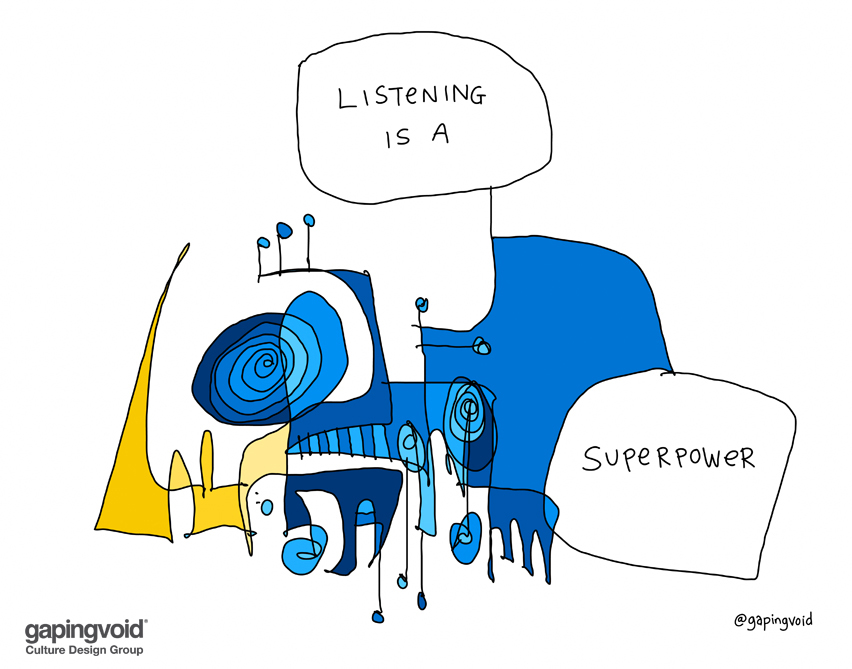
6. TO INCREASE LISTENING: Here's the paradox: No matter how powerful a story might be, it will have no impact unless there is someone listening to it. And listening, these days, is in woeful short supply. Most people who strike the appearance of listening, aren't. They are impatiently waiting their turn to speak. "Conversational endurance" is what I call it. And it seems to be getting worse with each passing tweet.
Is there any way to reverse this phenomenon -- any way to build the atrophied muscle of listening in this world? Yes, there is. And, if you are up for the paradox of it all, storytelling is the way to go. Because when you tell a story, assuming you tell it in a compelling way, the people on the receiving end get to practice listening. They get to experience what it is like not to interrupt. They get to experience what it's like not to counter with a fact, question, or objection. They get to feel something. In short, they get to practice the art of listening. And, as the old saw goes, "practice makes perfect."
My hope? The more people listen to your stories, the more their listening muscle will be exercised and the more able they will be listen to other people even in non-story situations.
7. TO HONOR OUR ELDERS: My father was a storyteller. Not professionally, but in his every day life. Other than yelling and stomping around the house, storytelling was his preferred means of communication. My response, as an all-knowing teenager, was to ignore, deflect, or judge his storytelling. "Not again," I would think to myself. "Jesus, I've heard this story a thousand times before." Heard? Yes. But listened? No. More often than not, I interpreted my father's storytelling as either a bogus way to hog the conversation or a feeble attempt to teach me something I already knew. And while I was, even as a young boy, very much into learning, I was not into being taught.
Years passed. Many. It wasn't until I was 45 that I understood the game I was playing. Addicted as I was to shooting the messenger, I was missing out on the message -- one that was hiding in my father's stories.
Methinks my little story-resisting dance with my father is not all that uncommon. Indeed, it's a phenomenon that plays out everywhere -- not just from child to parent, but from generation to generation. Driven by our adolescent need to individuate, even the most conscious of human beings have a tendency to ignore the elders in their life -- dismissing them as old-fashioned, irrelevant, or just not cool enough.
This just in: NOT TRUE! The stories of our parents, their parents, and the generations who preceded them are absolutely relevant. Indeed, they are part of our lineage and the collective unconscious of planet Earth, having, embedded within them, great value and meaning -- if only we would listen. The indigenous people of the world know this, big time. And always have. It is how the wisdom of their cultures have survived, one beautiful story at a time.
So... the next time you see an "old" person, realize they are not just old, but are an ELDER, an influential person of your tribe or community infused with the wisdom that comes from experience, even if they are not officially designated as a "sage." They may not have the same politics, philosophy, or spiritual path as you, but they have something more important -- and that is the potential to be a catalyst of great insight, knowledge, and wisdom.
Forget about the package for a moment. Forget about your judgments and your previous relationship with them. Just listen. Honor your elders. They have a gift for you and the gift is wrapped in STORY. All you have to do is open it.
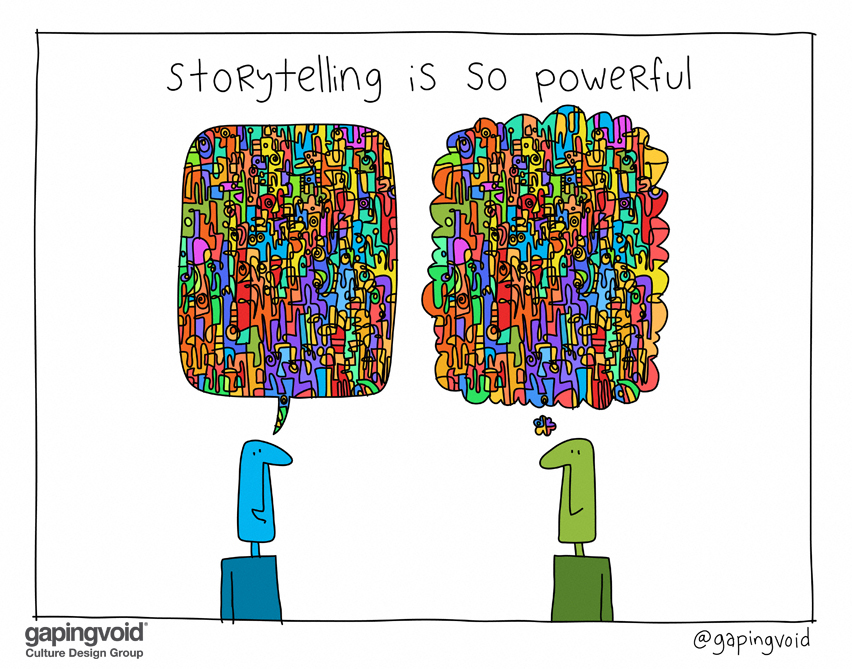
8. TO INSPIRE ACTION: Storytelling is kind of Swiss army knife. It has many different uses and can be applied in many ways. But ultimately, its purpose is to inspire action, even if that action is just a new way of thinking about something that will lead to an action in the world.
Bottom line, storytelling is a tool designed to spark change -- and the change begins in the listener's mind. Teachers, politicians, and spiritual leaders tell stories because they, ultimately, want their audiences to do something different -- to act in a way that is consistent with the message they are delivering -- whether that message is a plea for more kindness, perseverance, creativity, social responsibility, or self-esteem.
A story, well-told, activates people's ability to shift how they perceive what's possible. It's a tool, a lever, a way to move things. And how they move things is to inspire people to move things.
You have a story to tell. I know you do. Actually, you have many stories to tell. Some of them are expressions of memorable experiences you've had. Some of them are the retelling of stories you've heard or read that shifted the way you experienced yourself or the world. Both kinds of stories are pearls. Both need to be shared with the people in your life. Go for it!
9. TO SPARK INSIGHT AND WISDOM IN OTHERS: Human beings spend a lot of time in survival mode. Making a living. Keep a roof over their head. Finding food. You know, the basics. The amygdala rules, the default condition of our brain -- the part of our psyche that is on constant lookout for danger, more interested in surviving than thriving. And because this survival-seeking part of our species is usually dominant, we are not always alert to the more subtle promptings of the heart, the higher octave messages coming our way, variably known as hunches, insights, and epiphanies.
Something deep within us knows this. Which is why we go to church or temple on the weekends -- to take a break from the 9-5 and tune in to the timeless.
Stories have the potential to deliver the same kind of elevating truths we seek out in our religious practices. On any day of the week. At any time of the day. No dress code required. Because embedded in the stories we hear are a kind or radioactive isotope of wisdom -- insight sparking mojo with the potential to activate the sleeping sage within us.
That's one of the reasons why storytelling is so powerful. It democratizes wisdom. It takes the ancient truths out of the buildings we've constructed to worship God and makes them available to everyone -- no holy man or holy woman required. Just our willingness to share our stories. And everyone has a front row seat.
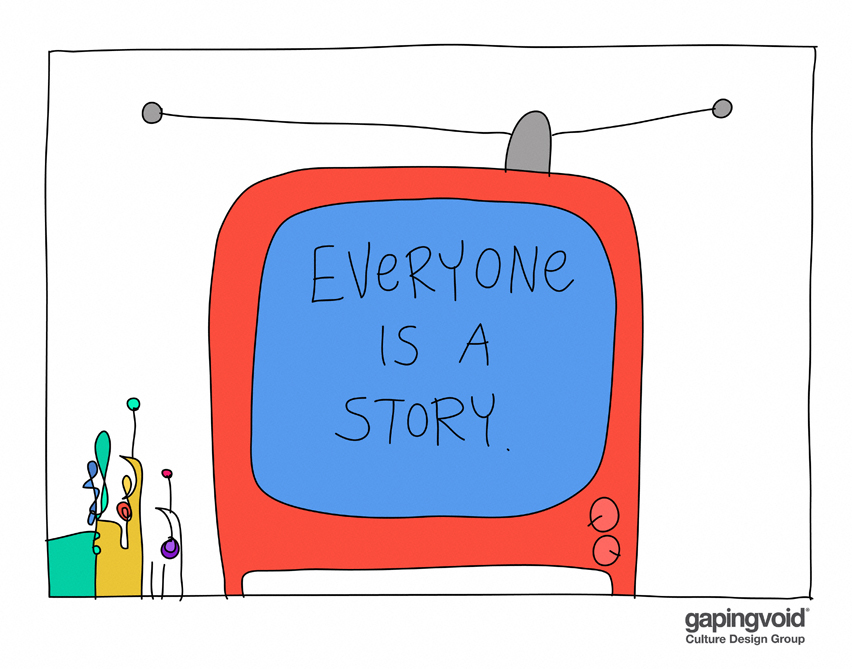
Upcoming Wisdom Circle Facilitation Training
Storytelling for the Revolution
MitchDitkoff.com
Illustrations: gapingvoid
Posted by Mitch Ditkoff at 11:28 PM | Comments (0)
August 16, 2023Let Your Inner Animal Out!
Just a quick heads up to let you know about a great new service being offered by Evelyne Pouget -- one that might be right up your alley, especially if there is (or has been) a special poochie, kitty, horse, or other soulful animal in your life.
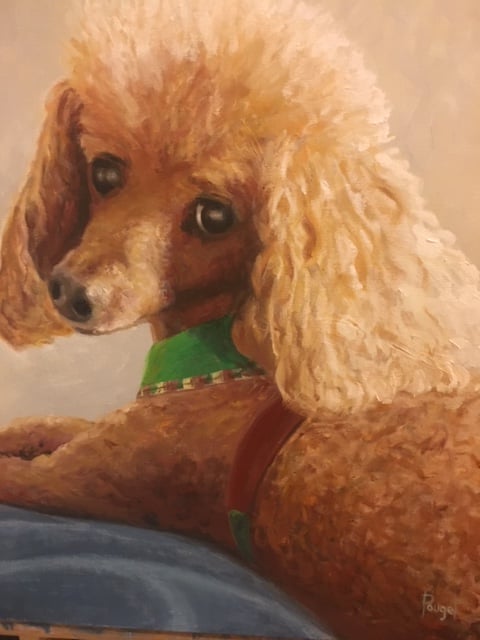
"I LOVE the painting! It is so lifelike and I truly feel Sparky's presence in the house. It's truly remarkable. I'm so very grateful to Evelyne for creating such a timeless treasure. The painting will be displayed prominently in my living room for all to see. He's watching over me still. So much gratitude to you!" -- Suzanne Leon
Evelyne is an extraordinarily talented artist (oil pastels, oils, and digital paintings) who also does commission work. The process of engaging her services is simple. All you need to do is email her a jpg of a photo you want her to work from. Depending on the composition of the photo, size, and medium you want (oil pastel or oil painting), she will quote you an exact fee.
Her email address: evelynepouget2@gmail.com
See below for more examples of Evelyne's pet portraits:

"The oil pastel work Evelyne created of my dog, Kaya. is one of my most prized possessions! She truly captured Kaya's essence -- her sweetness, bright spirit, and loving nature. This beautiful piece is something I will always cherish." -- Sarah Jacob



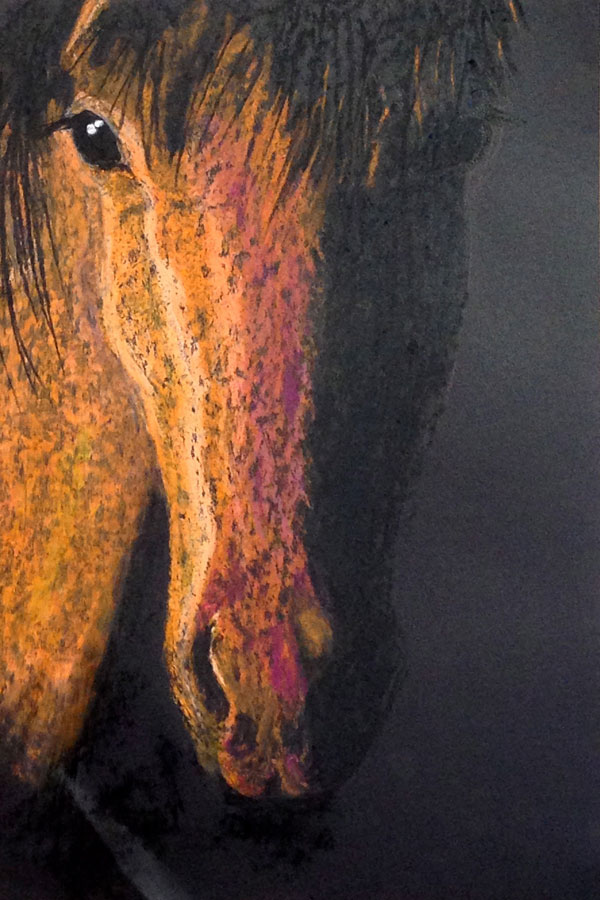





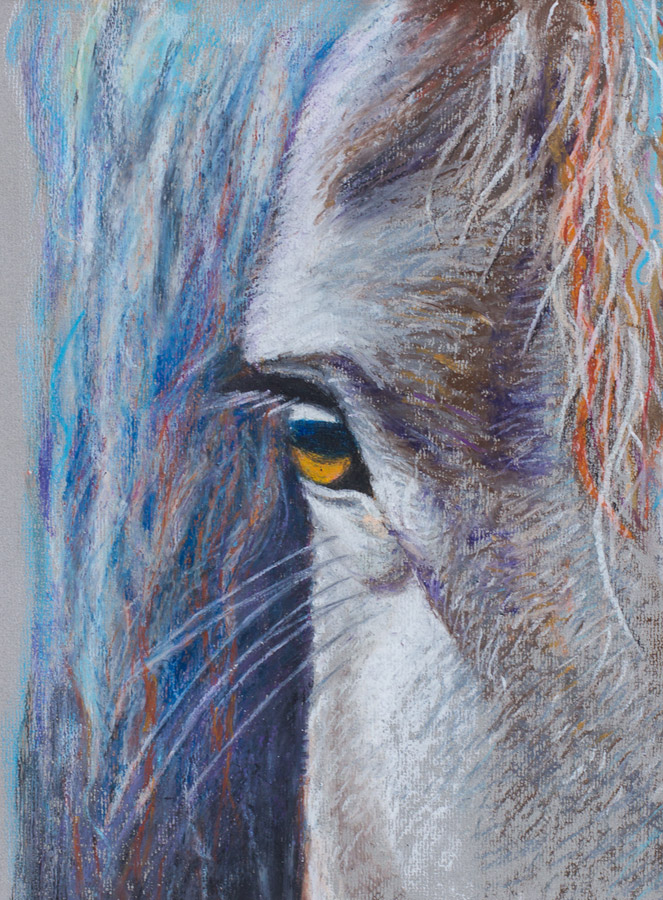
Evelyne also specializes in people portraits
And horse portraits
CONTACT: evelynepouget2@gmail.com
Posted by Mitch Ditkoff at 02:51 PM | Comments (0)
August 13, 2023The Sudden Glass of Orange Juice

There is an expression in poker called "going all in" which I've always loved. It refers to the moment when a poker player pushes all of his chips into the middle of the table, letting everyone know that he is betting everything, holding back nothing. Either his hand is so good, he knows he can't lose or he's trying to bluff everyone out of the game.
Several years ago, I had one of those moments -- not in a poker game, but in my kitchen. At the time, I was living in one of Prem Rawat's ashrams. Our lease was up and we had a only a week to move before the landlord threw us out.
We'd been trying for a while to find a new abode, but to no avail. The only place we could find -- just a few blocks away -- was a complete and total disaster. The previous tenant was a heroin addict and a devotee of the dark arts. As the realtor walked us from room to room we couldn't believe our eyes. Everywhere we looked there were syringes, many filled with blood. There was garbage everywhere, black magic books, rotting food, and, to top it all off, a dead dog in the back yard. Not exactly the centerfold of Metropolitan Home.
On the plus side, the rent was affordable and the house was available. Plus, the eight of us, ridiculously optimistic young men, were up for the challenge. And so we signed the lease.
For the next seven days we worked around the clock to rehabilitate the place. We pulled up rugs. We pulled up floors. We disinfected, scrubbed, scoured, power-sprayed, cleaned, vacuumed, painted, polished, and buried the dog. I still remember George Hope, bear hugging the refrigerator into submission and carrying it into the back yard to hose it down.
Now here's where things get even trippier. Three days after moving in, we get a phone call informing us that Mahatma Padarthanand, one of Prem's stellar emissaries from India, was arriving in Denver tomorrow and would be moving in with us for a month.
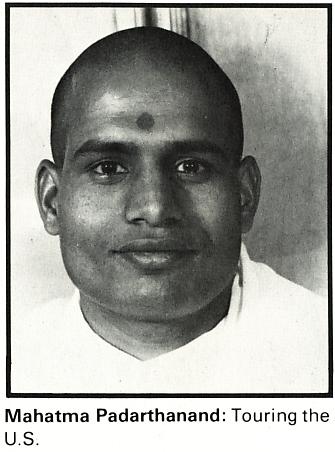
What? Really? Just seven days ago our house was a hellhole and now a holy man would be our guest?
My role in all of this was to make sure Mahatma-ji had what he needed. So, after showing him to his room, I asked if he had any requests.
"I'd like a glass of fresh-squeezed orange juice in the morning after meditation," he said.
"Yes, Mahahatma-ji," I replied. "Consider it done."
An hour later, I made my way to a grocery store, bought two dozen oranges, and put them in the frig.
So there we are, the next morning, in the meditation room. Padarthanand is sitting on his meditation cushion, me sneaking glances at him every few minutes and noticing how still he is. No fidgeting. No fussing. No nodding out, like the rest of us. The man is completely still.
Remembering his orange juice request, I exit quietly, enter the kitchen, and open the frig. The oranges are gone. Every single one of them. Gone. Gone. Gone beyond. Gone beyond beyond. They are not on another shelf. They are not in the drawer next to the carrots. They are nowhere to be seen.
"This is not good," I say to myself. "In just 20 minutes our house guest from India will be emerging from his meditation and the only thing he asked me for -- fresh orange juice -- will not be there.
I look at my watch. The moment is upon me -- the moment of choice. What do I do? Do I calmly wait for Mahatmaji and explain to him that someone ate his oranges? Or do I go all in and sprint, barefoot, in my pajamas (no time to get dressed) to the nearest 7-11. The choice is clear. There's not a doubt in my mind. Not a single one. In a flash, I'm out the door, running down the street, praying the 7-11 has oranges.
And they do. Lots of them. I grab two bags, throw some money on the counter, and take off.
Back in my kitchen, out of breath, but not out of time, I open the bags and cut. Then I squeeze. Then I cut again. Then I squeeze again -- 20 times in a row -- filling the only pitcher I can find. And then... just as I squeeze the last bit of juice from the last orange, out of the corner of my eye, I see Padarthanand, in his perfectly creased yoga whites, smiling ever so slightly, moving slowly towards me.
He takes a glass from the shelf. He takes a step in my direction. He extends his glass. I lift the pitcher and pour.
FOR YOUR REFLECTION: One thing I know is this: We are all living in our own reality -- the one we create for ourselves. What happened to me (or for me) on that Denver morning of no oranges was simply another chapter in the book of life I'm writing. There was no right or wrong decision to make that day. There was nothing good or bad about what came to pass or didn't. Everything that happened was simply a function of the choices I made.
Another person might have made an entirely different choice and that choice would have been right for them. On another day, I might have made a different choice. Who knows? Same kitchen. Same Mahatma. Same refrigerator empty of oranges. On that memorable morning, I could have easily chosen to accept the apprarent limits of the moment and the outcome would have turned out differently.
But that is not the choice I made. For me, at that very juicy moment, going for it meant making maximum effort to deliver on a promise I had made -- to honor my word -- no matter what the seeming constraints of the situation.
That same moment is upon me now -- whether I'm locked down, acting up, or unmasked. And I presume that same moment is upon you, too. The details of our lives may be different. The cards in our hands may not be the same, but the same choice is upon us both -- whether to "go for it" or not.
What is that "go for it" moment for you? What is calling you these days? What will you choose against all odds?
What's this thing with oranges in my life?
PremRawat.com
TimelessToday
Photo: Samuel Branch, Unsplash
Posted by Mitch Ditkoff at 11:19 PM | Comments (0)













